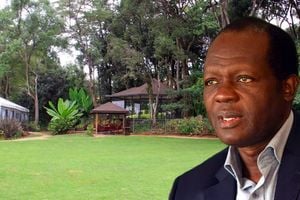Males make majority of teachers with disciplinary cases, says TSC

Kenya Institute of Special Education chief Norman Kiogora, TSC Chief Executive Nancy Macharia and Kenya Secondary School Heads Association boss Kahi Indimuli Kahi.
What you need to know:
- Thirty six male teachers were deregistered in March this year.
In July last year, all the 73 deregistered teachers were men as were the 71 struck off the roll in August 2019.
Males comprise the majority of tutors with disciplinary cases and who end up being banned from the profession by the Teachers Service Commission (TSC).
According to data that is periodically released by the commission and published on its website, men account for more than 90 per cent of disciplinary cases that lead to deregistration.
Once one is struck off the register, he or she is not allowed to teach in any school. Of the 366 teachers removed from the roll from 2017, only four are female.
The TSC disciplines tutors through the Code of Regulations for Teachers, 2015 and the Code of Conduct and Ethics, 2015.
The two sets of regulations provide procedures for teacher discipline.
By June, the commission had received 1,007 cases related to discipline. Of these, some 867 have been heard and finalised while 140 others are pending at regional offices since the function has been decentralised.
Thirty six male teachers were deregistered in March this year.
A total of 1,128 cases were heard and determined in 2021 and 2022, while the previous year recorded 703, the least number in five years, probably because of schools closure occasioned by the pandemic.
Not all teachers who undergo disciplinary process are dismissed. Those found not culpable are reinstated into the payroll immediately or after serving suspension.
Instructors whose appeals are successful before the Review Committee are reinstated and paid for the period they were out of the payroll.
National Assembly Education Committee members raised concerns over the disciplinary procedures employed by the commission and complained that once dismissed, teachers cannot be rehired even if cleared of allegations by courts.
“The employer can utilise internal disciplinary processes regardless of what’s going on in the criminal justice system, especially for sexual offences. This is professional misconduct,” said Cavin Anyuor, the TSC Legal, Labour and Industrial Relations chief.
In July last year, all the 73 deregistered teachers were men as were the 71 struck off the roll in August 2019.
Twenty four other male teachers had been deregistered in May of the same year.
Teachers deregistered recently include 40 males and one female in March 2020, thirty-one males in December 2020, forty three men and one woman in September 2021 and 44 males and two females in October last year.
Commission CEO, Nancy Macharia, told lawmakers that investigations begin once a complaint is received.
A committee reviews the complaint to determine if it warrants an interdiction. The hearing of the case comes last.
Teachers on interdiction receive half their pay, but not those embargoed for desertion.
“They receive no salary because their whereabouts are unknown. There are instances of a disciplinary process leading to dismissal and removal from the register of teachers,” Ms Macharia said.
“Such a teacher may appeal to the Review Committee or in court. Where an order is issued for reinstatement to the register, the names of such teachers are reinstated as per the directive but not to employment.”
A person whose name has been removed from the register of teachers is eligible to apply for reinstatement after 18 months.
Kenya Secondary School Heads Association Chairman, Kahi Indimuli, told the Sunday Nation that most cases of males being dismissed from the service involve sexual relations with learners and embezzlement of school funds.
“Allegations of carnal knowledge are serious. It’s very difficult for the principal to record the offence, evidence, report a teacher and act as a prosecutor. The disciplinary process is often in favour of the child,” Mr Indimuli said.
Disciplining teachers is one of the functions some education stakeholders want taken away from the TSC and handled by an independent agency.
They argue that the commission cannot be the employer and regulator of the profession.
Members of the National Assembly Education team complained that cases take long.
Marakwet West MP, Timothy Toroitich, proposed that regulations governing the process be changed.
“Many teachers are suffering because of this. They are not reinstated even when the claims are proved not to be untrue,” he said.





